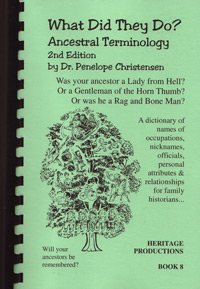 A dictionary, a glossary, a desk reference, I am not sure any of these perfectly describe What Did They Do? Ancestral Terminology. However, Dr. Penelope Christensen, the author, calls the book a dictionary, so I guess that is good enough for this review. In her words, the book is “a dictionary of names of occupations, nicknames, officials, personal attributes & relationships for family historians.” Terms and phrases are predominately of English origin from between 50 and 300 years ago. English, in this case, being British. There are also some North American and Australian terms provided in cases where foreign and British usage differs and may cause added confusion. The essence of the book is to provide a modern translations to older terminology.
A dictionary, a glossary, a desk reference, I am not sure any of these perfectly describe What Did They Do? Ancestral Terminology. However, Dr. Penelope Christensen, the author, calls the book a dictionary, so I guess that is good enough for this review. In her words, the book is “a dictionary of names of occupations, nicknames, officials, personal attributes & relationships for family historians.” Terms and phrases are predominately of English origin from between 50 and 300 years ago. English, in this case, being British. There are also some North American and Australian terms provided in cases where foreign and British usage differs and may cause added confusion. The essence of the book is to provide a modern translations to older terminology.
Simply put, language changes. More so, idioms, slang, common phrases, popular words, provincial and colloquial speech change with time. Identifying and understanding the meaning of outdated references can be comical. However, when trying to conduct research comedy may lighten the mood for the moment, but getting to the meaning of words is critical to ultimate success. Here is a little test of your knowledge, from the book. Do you know the meaning of the following:
- Broderer
- Brogger
- Conductress
- Goff
- Kirver
- Puisne
- Traynor
I wouldn’t dream of leaving you hanging, so here are the answers:
- Broderer: Embroiderer
- Brogger: Raw wool merchant; Person disposing of stolen property or fence (I guessed thief, so I give myself a point here)
- Conductress: Female shop assistant (I would have guessed early phrase for flight attendant)
- Goff: Smith
- Kirver: The picksman who prepared coal seam for hewing
- Puisne: Judge of superior court, inferior in rank to chief judge
- Traynor: Trapper
I’ll admit, I specifically chose some words I was not familiar with. Other I knew, but there is plenty here to learn. The volume has over 9,750 terms, many having multiple meanings, like “brogger.” Dr. Christensen points out that as wide spread as she has tried to make this book, there is no way to cover every possible term. Expansive volumes exist, covering very detailed and precise language variations for local dialects, local trades, and spelling variations. But, does anyone really want to purchase, store, and carry around Wright’s six-volumed English Dialect Dictionary? And that would be just a start.
Instead, Christensen has provided a reasonably sized, yet surprisingly thorough, coverage of the critical names and occupations one may expect to find in their family history research.
Ancestral Terminology is book 8 in The Heritage Book Series. This series represents a collection of professional genealogical guides published in Canada. However, this does not diminish the value of the techniques taught in the book for the U.S. market. If you speak and research in the English language, then this book was written for you.
Table of Contents
What Did They Do?
Introduction
Content
Sources
- Style – Terms
- Description
- Terminology Starting with A
- Terminology Starting with B
- Terminology Starting with C
- Terminology Starting with D
- Terminology Starting with E
- Terminology Starting with F
- Terminology Starting with G
- Terminology Starting with H
- Terminology Starting with J
- Terminology Starting with K
- Terminology Starting with L
- Terminology Starting with M
- Terminology Starting with N
- Terminology Starting with O
- Terminology Starting with P
- Terminology Starting with Q
- Terminology Starting with R
- Terminology Starting with S
- Terminology Starting with T
- Terminology Starting with U
- Terminology Starting with V
- Terminology Starting with W
- Terminology Starting with X
- Terminology Starting with Y
- Terminology Starting with Z
References
Order What Did They Do? Ancestral Terminology from Family Roots Publishing; Item #: HB08, Price: $24.50.
I have a good one for you (I don’t know if it’s in the book you mentioned in this article.) I work at the Eastham Historical Society on Cape Cod. In several of our documents early settlers (some Mayflower passengers or children of) served the town as “Negative Men” or “Negative Man.” I wrote to the NEHGS but they couldn’t answer what this appointment might mean or “what they did.” Any ideas??